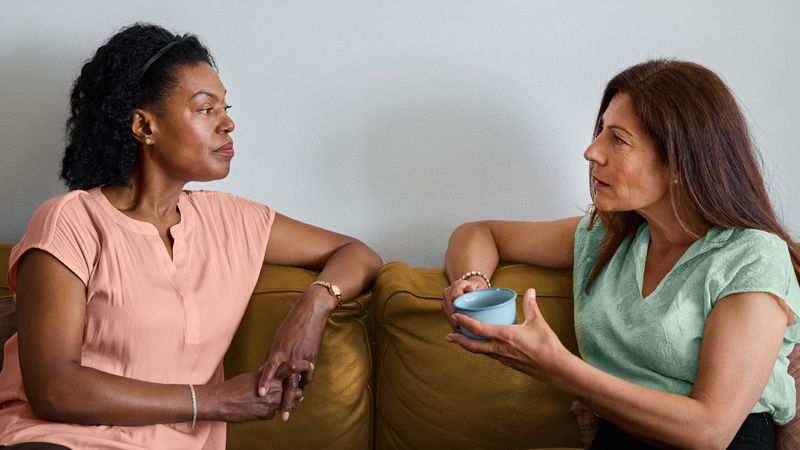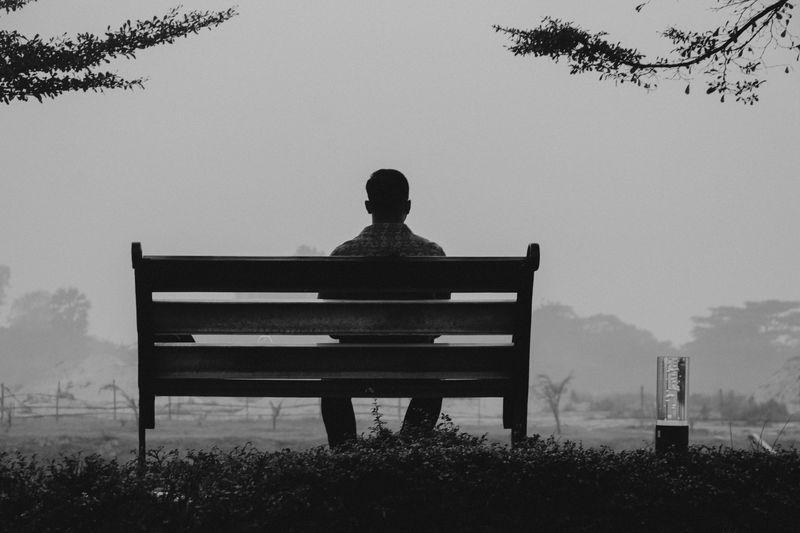18 Signs You’re The Person Everyone Goes To—But No One Checks On
Being the person everyone relies on can be a rewarding yet lonely role. While you’re a beacon of support for friends and family, you might notice that the same concern isn’t always reciprocated.
This blog post explores the nuanced signs that you are the unsung hero, often overlooked, and what hidden burnout can look like.
As you read through these 18 signs, remember that your feelings are valid and seeking support is a strength, not a weakness.
1. You answer texts fast—but yours go unread

Your phone buzzes, and you respond promptly, a reflex honed over years. However, when you send messages, they linger, unnoticed. You’re the go-to for urgent advice, yet your own words seem to fade into the digital ether. It’s not that people don’t care; it’s just that your reliability has become an unspoken norm.
In moments of need, you wish for the same urgency in return. It’s not about being overly sensitive; it’s about wanting acknowledgment. This pattern can create a subtle sense of isolation, where your needs are shelved next to unread conversations. Every message sent feels like a whisper into the void, hoping for an echo that rarely comes back.
2. People vent to you, but rarely ask how you are

Conversations gravitate toward others’ troubles, naturally flowing into a monologue directed at your listening ears. You’re known for your empathic presence, a safe harbor in emotional storms. Yet, these exchanges often conclude without a genuine inquiry into your own well-being.
This dynamic leaves you quietly pondering if your own challenges hold any weight. The art of listening becomes a solitary practice, where your voice is seldom heard. It’s not about seeking attention but yearning for mutuality in relationships.
Your emotional energy, though abundant, is not infinite. The imbalance can sometimes feel like a burdensome cloak, heavy and unshared.
3. You feel guilty saying “I can’t help right now”

When faced with the choice to set boundaries, guilt seeps in like an unwelcome guest. Declining to assist feels like a betrayal of your identity as the helper.
This inner turmoil is a testament to the expectations you’ve shouldered, both self-imposed and external. Saying “no” is not a refusal to care but a necessary act of self-preservation.
It’s a reminder that your time and energy are valuable, deserving of respect and consideration. Yet, the guilt remains, a silent echo of the fear that you’ll be perceived differently.
Balancing the scales between self-care and support often feels like walking a tightrope, with guilt as the ever-present counterweight.
4. Your strength gets mistaken for being “fine”

With a steady demeanor, you navigate life’s challenges, exuding a resilience that others admire. However, this external strength often masks internal struggles, leading others to assume you’re always “fine.” Your ability to maintain composure is both a gift and a curse, a façade that obscures the need for support.
The misconception that strength equates to invulnerability can be isolating. It’s not that you’re unwilling to share; sometimes, it’s the fear of shattering the image others hold of you.
Behind the confident smiles lies a complexity of emotions, waiting for the right moment to surface. The acknowledgment of your own vulnerabilities becomes a quiet act of courage.
5. You apologize when you finally express emotion

Expressing your feelings comes with an instinctive apology, as if your emotions are an inconvenience to others. This habitual reflex stems from years of prioritizing others’ comfort over your own.
It’s not that your emotions are unwelcome, but the seldom occurrence of their display amplifies the perceived disruption.
The apology is a shield, shielding you from potential awkwardness or misunderstanding. Yet, this constant need to say “sorry” can dilute the genuine expression of your emotional landscape.
Breaking this cycle requires recognizing that your feelings are valid and worthy of space, without the need for preemptive apologies.
6. Everyone trusts you with their hard stuff

Your reputation as a confidante is well-earned, a testament to your reliability and discretion. People entrust you with their deepest fears and troubles, knowing they’ll find understanding and empathy. This sacred role, however, can become a heavy mantle, especially when your own burdens remain unshared.
The trust others place in you is a double-edged sword, bringing connection and isolation in equal measure. While you cherish the bonds formed, the absence of reciprocation can leave an empty space where your own stories should reside. It’s a reminder that trust is a mutual exchange, deserving of balance and care.
7. You often feel tired—but can’t explain why

Fatigue weaves through your days, an uninvited companion that defies easy explanations. It’s not mere physical exhaustion but an emotional depletion, accumulated over time.
The constant readiness to support takes its toll, sapping energy reserves slowly but surely. It’s the weight of being “on call” for others’ needs, even when your own remain unaddressed.
This weariness is a subtle indicator of imbalance, a silent plea for replenishment. Yet, articulating its origin proves elusive, as the demands of daily life continue to swirl around you. Finding moments to pause and recharge becomes essential, a nurturing act of self-compassion.
8. You downplay your needs because others “have it worse”

In the grand tapestry of struggles, yours seem insignificant, overshadowed by others’ more pressing issues. You minimize your needs, convinced they’re less urgent, less deserving of attention.
This tendency to downplay stems from a compassionate heart, always prioritizing the welfare of others. Yet, it often leaves your own needs unmet, quietly simmering beneath the surface.
Acknowledging that your challenges hold value is a radical act of self-acceptance. It’s a shift from viewing empathy as a finite resource to embracing it as abundant and inclusive. Your journey of self-discovery begins with the simple recognition that your needs matter too.
9. You’re rarely surprised when someone needs you

The call or text for help arrives, and you’re ready, almost anticipating it. This predictability is both a comfort and a burden, a testament to your role as the dependable one.
While others may find surprise in such moments, for you, it’s just another day. This constant readiness can lead to an unspoken expectation, where your availability is taken for granted.
It’s not that you mind offering support, but the lack of reciprocity can weigh heavily. The absence of surprise in these interactions highlights the need for a balance, where your own moments of need are met with equal attentiveness.
10. You always listen—but few do the same

Listening is your superpower, an art you’ve mastered through years of practice. Friends and family know they can rely on you to hear them out, providing comfort and understanding.
Yet, when it comes to your own stories, the silence can be deafening. It’s not that others don’t care; it’s just that your role as the listener is so ingrained, it’s often overlooked.
This imbalance, though subtle, can create a sense of disconnection. The desire for someone to truly listen, to delve into your world, becomes an unspoken wish. Finding those willing to reciprocate can feel like discovering a rare treasure.
11. You celebrate others—and sit alone in your lows

Celebrations fill your calendar, each one an opportunity to uplift those around you. Your enthusiasm for others’ successes is genuine, a reflection of your supportive spirit.
However, when the tables turn and you’re faced with your own lows, solitude often becomes your companion. It’s not that others are absent; sometimes, it’s the difficulty of reaching out that creates the distance.
Your willingness to celebrate others is an extension of your heart, but it doesn’t diminish the need for companionship in your own times of need. These solitary moments can be a gentle reminder to let others in, to share in both joy and sorrow.
12. You give advice—but avoid asking for any

Sharing wisdom is second nature, a skill honed through years of experience. Friends seek your counsel, knowing they’ll receive thoughtful, considered advice. Yet, when the roles reverse, asking for guidance feels foreign, almost uncomfortable.
This reluctance to seek advice stems from a deep-seated independence, a belief that you should have the answers. It’s not a lack of trust in others, but a habit of self-reliance that proves difficult to break.
Realizing that seeking advice is not a sign of weakness but a step towards growth can be liberating. Embracing this vulnerability allows for deeper connections and mutual support.
13. You take care of everyone—and go unnoticed

Your care for others is unwavering, a cornerstone of your identity. From small gestures to significant sacrifices, your efforts weave a tapestry of support for those around you.
However, the extent of your care often goes unnoticed, blending into the background like the steady hum of everyday life. It’s not that your contributions lack value; they’re simply taken for granted.
This invisibility can lead to feelings of being underappreciated, where the desire for acknowledgment becomes a silent hope. Yet, your commitment to caregiving remains steadfast, a testament to your generous spirit.
14. People lean on you—but you never feel held

Your presence is a pillar of strength for those around you, a reliable support in times of need. Friends and family lean on you, knowing they’ll find solace and understanding.
Yet, despite being surrounded by people, the sensation of being truly held remains elusive. It’s not a lack of love but the absence of reciprocal support that creates this gap.
The longing to be embraced, both physically and emotionally, becomes a quiet ache. Finding those who can offer the same steadfast support you provide becomes an essential journey towards balance and fulfillment.
15. You feel selfish even thinking about your own needs

Contemplating your own needs feels like a luxury, a notion tinged with guilt. The idea of prioritizing yourself seems selfish, at odds with the selflessness you’ve cultivated.
This internal conflict is a reflection of deeply ingrained beliefs about worthiness and value. Acknowledging your own needs doesn’t diminish your capacity to care for others; it enhances it.
Reframing self-care as an integral part of well-being is a transformative shift. It allows you to approach your own needs with compassion, recognizing that nurturing yourself is a foundation for nurturing those around you.
16. Silence feels safer than being vulnerable

In a world that often demands openness, silence becomes your refuge. The vulnerability of sharing your innermost thoughts feels daunting, a step into the unknown.
It’s not that you’re unable to connect; it’s the fear of exposure, of being misunderstood, that keeps you guarded. Silence offers a shield, a space where you can reflect without judgment.
Yet, this solitude can also be isolating, a barrier to deeper connections. Embracing vulnerability, even in small doses, can open doors to authentic relationships, where your true self is seen and valued.
17. You crave someone to ask, “How are you—really?”

Amidst the daily exchanges of “How are you?” lies a deeper craving for genuine inquiry. You yearn for someone to pause, to ask with sincerity and patience.
This desire goes beyond mere curiosity; it’s a plea for connection, for someone to delve beneath the surface. The question “How are you—really?” becomes a bridge to understanding, a lifeline to authenticity.
Finding individuals who offer this depth of connection can feel like a rare gift, a reminder that your well-being is important. It reaffirms the belief that true support is not just about presence but about presence with intention.
18. You secretly wonder if they’d show up for you

Beneath the layers of support you provide lies an unspoken question: Would others show up for you as you do for them? This uncertainty lingers, a shadow beneath your unwavering support.
It’s not a lack of confidence in your relationships but a natural curiosity about their depth. The thought of needing support, of asking for help, feels vulnerable and uncertain.
This wondering is not about testing others but understanding the strength of your connections. It highlights the importance of cultivating relationships where support is a two-way street, built on mutual care and understanding.







